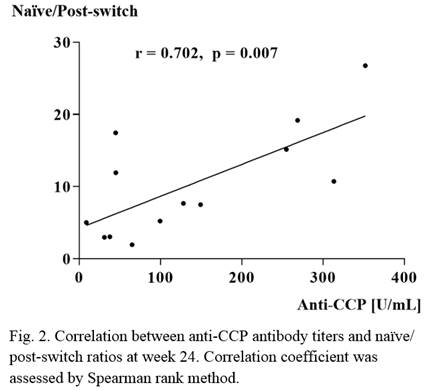Session Information
Date: Tuesday, November 15, 2016
Title: Rheumatoid Arthritis – Small Molecules, Biologics and Gene Therapy - Poster III
Session Type: ACR Poster Session C
Session Time: 9:00AM-11:00AM
Background/Purpose: Tocilizumab (TCZ), an anti-IL-6 receptor monoclonal antibody, has been recognized as one of the highly effective therapeutic agents in RA, but its contribution to B-cell function remains to be elucidated. Our purpose was to analyze the effects of TCZ on B-cell subpopulation and its ability to produce anti-CCP antibody during the treatment for RA.
Methods: Consecutive RA patients who initiated treatment with TCZ between December 2013 and September 2015 were enrolled in our prospective study. All patients met 2010 ACR/EULAR classification criteria for RA and were treated with 162mg of TCZ subcutaneously every other week. Peripheral blood samples were collected and B-cell subsets were analyzed by flow cytometry at baseline, and during TCZ treatment at week 12 and 24. Clinical parameters, including disease activity and serum level of autoantibodies, were also evaluated in these periods. The protocol of this study was approved by the ethics committee of Hokkaido University Hospital.
Results: Fourteen patients were enrolled but one dropped out because of missing data. Remaining 13 patients were analyzed at the baseline and during the follow-up periods. DAS28-ESR significantly improved at week 12 (2.42 ± 1.14, p < 0.001) and week 24 (2.20 ± 1.00, p < 0.001) compared to baseline (5.00 ± 1.39). Anti-CCP antibody titers significantly decreased at week 24 compared to baseline (p = 0.033, Fig. 1). In flow cytometry analysis, the percentages of post-switch memory B cells (CD19+CD27+CD38-IgD-) in the population of CD19 positive cells were significantly higher at week 12 than those at baseline (p = 0.011). The changes in naïve B cells (CD19+CD27-) and those in post-switch memory B cells from baseline to week 24 were inversely correlated (r = -0.703, p = 0.007). Furthermore, the ratios of naïve to post-switch memory B cells (naïve/post-switch) correlated positively with anti-CCP antibody titers regardless of the time-points (r = 0.621, p = 0.024 at baseline, r = 0.623, p = 0.023 at week 12, and r = 0.702, p = 0.007 at week 24, Fig. 2). The changes in naïve/post-switch and the changes in anti-CCP antibody titers also showed positive correlation from baseline to week 12 (r = 0.709, p = 0.007) and from baseline to week 24 (r = 0.588, p = 0.035).
Conclusion: Our study indicated that anti-CCP antibody titers reflect B-cell distribution and that TCZ has a potential to modulate the production of anti-CCP antibody by affecting naïve/post-switch ratio. The increment of post-switch memory B cells after TCZ treatment may reflect the re-distribution of this subset into circulation from arthritic joints, which results in suppressed production of anti-CCP antibody.
To cite this abstract in AMA style:
Noguchi A, Yasuda S, Hisada R, Ohmura K, Shimamura S, Shimizu Y, Kato M, Oku K, Bohgaki T, Amengual O, Horita T, Suzuki M, Matsumoto Y, Atsumi T. Anti-CCP Antibody Titers Decrease with Altered B-Cell Subpopulation in RA Patients Treated with Tocilizumab [abstract]. Arthritis Rheumatol. 2016; 68 (suppl 10). https://acrabstracts.org/abstract/anti-ccp-antibody-titers-decrease-with-altered-b-cell-subpopulation-in-ra-patients-treated-with-tocilizumab/. Accessed .« Back to 2016 ACR/ARHP Annual Meeting
ACR Meeting Abstracts - https://acrabstracts.org/abstract/anti-ccp-antibody-titers-decrease-with-altered-b-cell-subpopulation-in-ra-patients-treated-with-tocilizumab/


